| Srl | Item |
| 1 |
ID:
126411
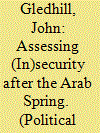

|
|
|
|
|
| Publication |
2013.
|
| Summary/Abstract |
More than two years after the heady days of protest and uprising that characterized the Arab Spring, the glow of revolution has given way to the intricacies and complications of regime building. Coalitions are being formed, constitutions written, judiciaries vetted, and security services (re)built. As collective attention focuses on these complexities of regime restructuring, it is worth noting that a fundamental security paradox sits at the heart of transitions in the Middle East and North Africa. On one hand, individuals who hit the streets or battlefields in support of revolution in 2011 did so in the belief that a new form of government would improve their political, social, and economic security over the long term. On the other hand, subsequent (and ongoing) efforts to draft new rules of the political game have triggered internal conflicts and, on occasion, those conflicts have compromised citizens' physical security over the short term.
|
|
|
|
|
|
|
|
|
|
|
|
|
|
|
|
| 2 |
ID:
172446
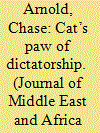

|
|
|
|
|
| Summary/Abstract |
In 1948, British authorities in the Gold Coast implemented a series of security reforms aimed at resisting future disruptions resulting from growing discontent with colonial rule. These reforms included the formation of a police intelligence organization, developed in collaboration with the British Security Service. This expansion of the colonial state into intelligence work preceded its first steps toward self-rule, inadvertently making this intelligence program an unintended participant in the process of decolonization. This article examines the foundations of that intelligence network and how it resisted the political exigencies required by the Gold Coast’s entry into diarchy. It explains how British officials arrived at the conclusion that a West African colony required a modern, intelligence-gathering apparatus under the oversight of the British Security Service and how that security system was used to challenge the realization of an independent Ghanaian state under the leadership of Kwame Nkrumah.
|
|
|
|
|
|
|
|
|
|
|
|
|
|
|
|
| 3 |
ID:
140984
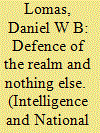

|
|
|
|
|
| Summary/Abstract |
In May 2013, a report on the British Security Service (MI5) by Sir Samuel Findlater Stewart was released by the Cabinet Office. Dated November 1945, the report on the future organization and activities of MI5 was significant in that it defined the Service's post-war remit, accountability and relations with the Secret Intelligence Service (SIS), laying the groundwork of MI5's mandate until the introduction of the Security Service Act in 1989. The article also suggests that the report is significant, not just because it sheds important light on MI5's wartime and post-war role, but because it helps question existing assumptions about the relationship between the Security Service and the post-war Labour Government of Clement Attlee, often viewed as a troubled one.
|
|
|
|
|
|
|
|
|
|
|
|
|
|
|
|
| 4 |
ID:
092975
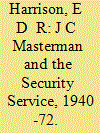

|
|
|
|
|
| Publication |
2009.
|
| Summary/Abstract |
The significance of J.C. Masterman's relationship with the Security Service, MI5, has not been fully appreciated. As a junior officer during World War II, he consistently sought to achieve good working relations with the Secret Intelligence Service. After the war he continued to take an interest in the Security Service and worked closely with other MI5 elder statesmen to ensure that the successor to Percy Sillitoe as Director-General came from within the Service. Masterman always hoped that his account of the double agents run by British Intelligence during World War II would one day be published. As the public image of the British secret services deteriorated during the 1960s, Masterman believed that MI5 did not grasp how his book could promote its interests, and so he insisted on forcing through publication anyway. The correspondence from serving and former MI5 officers in Masterman's papers vividly illustrate changing attitudes to official secrecy and the declining ability of the British Government to enforce it.
|
|
|
|
|
|
|
|
|
|
|
|
|
|
|
|
| 5 |
ID:
129296


|
|
|
| 6 |
ID:
145240
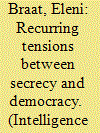

|
|
|
|
|
| Summary/Abstract |
There is a recurring tension between secrecy and democracy. This article analyzes the continually ambiguous relations between intelligence and security agencies and their parliamentary principals. I present a novel conceptual framework to analyze political relations influenced by secrecy. I draw on Albert Hirschman's concepts of exit, voice and loyalty and Max Weber's ideal types of the ethics of conviction and responsibility. The focus is a case study of the Dutch parliament and Security Service between 1975 and 1995. The analysis demonstrates how parliament can deal constructively with the secret services. This depends both on party-political responses to secrecy and strategic responses on the part of the secret services to deteriorating relationships with parliament.
|
|
|
|
|
|
|
|
|
|
|
|
|
|
|
|
| 7 |
ID:
077081
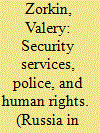

|
|
|
|
|
| Publication |
2007.
|
| Summary/Abstract |
States should take inventory of the laws that regulate the limitations on human rights in the course of implementation of security measures. Most importantly, they should ensure various controls over security services and police by parliamentary and governmental bodies
|
|
|
|
|
|
|
|
|
|
|
|
|
|
|
|
| 8 |
ID:
124575
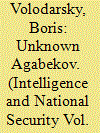

|
|
|
|
|
| Publication |
2013.
|
| Summary/Abstract |
The decision to declassify selected historical documents from the archives of the Security Service in 1997 has been a boon to academic historians of intelligence. The declassified files reveal the successes and failures of the Security Service in fulfilling its statutory function of defending the realm. Yet the activity of Soviet spies continues to be one of the most challenging topics in intelligence history. The role of Soviet defectors in transforming the Security Service's understanding of the nature and extent of Soviet intelligence operations, meanwhile, remains largely understudied. In the case of Agabekov, for example, the reaction of SIS or MI5 to his 'disappearance' in the spring of 1938 has long been neglected. It is possible that there was no reaction at all, because both services had long-since written off Agabekov as a source. This helps explain why Agabekov's case has been ignored in the relevant literature in both Russia and the West.
|
|
|
|
|
|
|
|
|
|
|
|
|
|
|
|
| 9 |
ID:
099253
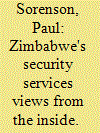

|
|
|
|
|
| Publication |
2010.
|
| Summary/Abstract |
The testimony of ex-servicemen provides a unique insight into Zimbabwe's security architecture. The country's war veterans - many only in their early twenties at independence - are still firmly embedded in the status quo, and remain ideologically committed to Zanu-PF. Though junior officers may be disillusioned, a coup is nevertheless unlikely unless Mugabe loses control of the carefully constructed system of fear, nepotism and loyalty.
|
|
|
|
|
|
|
|
|
|
|
|
|
|
|
|